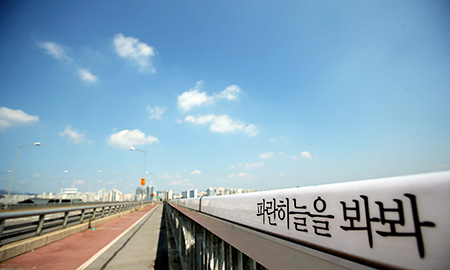- California Assembly OKs highest minimum wage in nation
- S. Korea unveils first graphic cigarette warnings
- US joins with South Korea, Japan in bid to deter North Korea
- LPGA golfer Chun In-gee finally back in action
- S. Korea won’t be top seed in final World Cup qualification round
- US men’s soccer misses 2nd straight Olympics
- US back on track in qualifying with 4-0 win over Guatemala
- High-intensity workout injuries spawn cottage industry
- CDC expands range of Zika mosquitoes into parts of Northeast
- Who knew? ‘The Walking Dead’ is helping families connect
S. Korean teenagers’ sleep hours linked to suicide: study

A phrase on the handrail of Mapo Bridge in Seoul reads, “Look up the blue sky!” on Thursday, World Suicide Prevention Day. The city government put up such signs to discourage people from trying to commit suicide as the bridge has the largest number of people leaping to their deaths among the bridges over the Han River. A study showed sleep deprivation can increase the likelihood of suicide among teenagers. (Yonhap)
By Kim Se-jeong
Teenagers who do not get sufficient sleep are more likely to think about and plan suicide, a study showed Thursday.
The study, which was released on World Suicide Prevention Day, partially explains the high ratio of suicides among teenagers in Korea, where middle and high schools sleep for an average of six hours.
A team led by Professor Yoo Ki-bong of Eulji University said teenagers who sleep for fewer than seven hours each night are almost 1.5 times more likely to think about killing themselves than those who sleep seven hours.
Sleep deprivation encourages teenagers to plan suicide, according to the study. Those with below seven hours of sleep were 1.7 times more likely to plan suicide, while those with more than seven hours were less likely to do so.
The study was based on survey of 191,642 people between the ages of 14 and 19 across the country between 2011 and 2013, and it was published in the most recent issue of a British journal, BMJ Open.
It implies the low number of average sleeping hours among Korean students may be linked to their suicidal behavior.
According to the Korean Society of Sleep Medicine, Korean students sleep for 6.65 hours per day on average, while suicide is the No. 1 cause of death among schoolchildren here, followed by traffic accidents and cancer.
Students fail to get enough sleep mainly because of the long hours of study caused by pressure from parents to achieve good academic grades. Students spend long hours in schools or at private institutes to score high in university entrance exams. Graduating from prestigious universities determines future income and social status, and those who can’t make it sometimes kill themselves.
The leading author Yoo said that a sleep time assessment should be included in evaluating suicidal behaviors. “Schools and parents should encourage children to sleep for at least seven hours,” he said.
A high suicide rate is also prevalent among the older population. According to statistics, 14,427 killed themselves in 2013, meaning 28.5 out of every 100,000. That was the highest among the OECD member states, and more than doubled the average rate of 12 per 100,000.
Experts say the government should pay more attention to preventing suicides. “The high suicide rate means people feel life is tough. This is not a personal problem, but a complex social problem which the government should try to address,” said an official from the National Medical Center.
The lack of interest partly means insufficient funds. This year’s government budget for suicide prevention is 8.9 billion won, while the Japanese government spends approximately 300 billion won every year on the issue.












![일본 사도광산 [서경덕 교수 제공. 재판매 및 DB 금지]](http://www.koreatimesus.com/wp-content/uploads/2024/07/PYH2024072610800050400_P4-copy-120x134.jpg)



Pingback: Trinity Medical Center Sleep Study | care - best medical center
Pingback: Eulji University Medical Center | list of hospitals
Pingback: Korea University Medical Center Ansan Hospital | exclusive - finest hospitals
Pingback: Hallym Medical Center Korea | info - abortion clinics